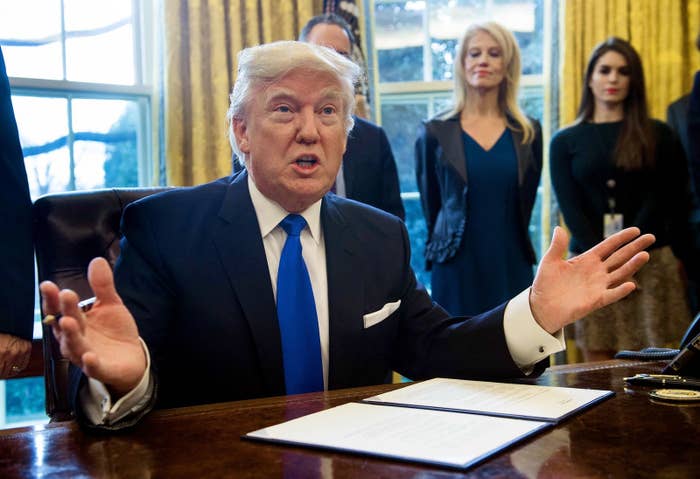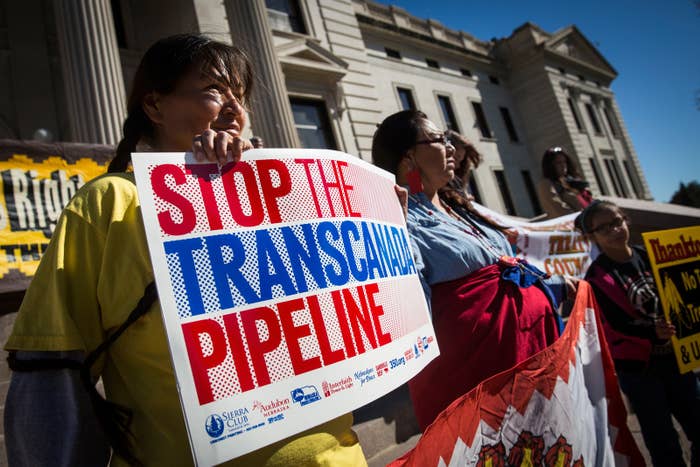
President Donald Trump resurrected two massive pipeline projects on Tuesday, drawing ire and threats of legal action from the movement that fought to keep them off US land.
"We will see his administration in court,” said Trip Van Noppen, president of the nonprofit group Earthjustice, which represented the Standing Rock Sioux tribe in challenging the Dakota Access Pipeline, in a statement. “[Trump] should brace himself to contend with the laws he is flouting, and the millions of Americans who are opposed to these dangerous and destructive projects."
“We are opposed to reckless and politically motivated development projects, like DAPL, that ignore our treaty rights and risk our water," the chairman of the Standing Rock Sioux Tribe, Dave Archambault II, said in a statement.
In December, the US Army Corps of Engineers denied pipeline builder Energy Transfer Partners the necessary permission to build the Dakota Access Pipeline under Lake Oahe in North Dakota, and called for additional environmental review of pipeline routes.
The decision arrived after months of protests and legal action led by the Standing Rock Sioux Tribe, which contended that the pipeline threatened a key water source. The tribe also argued that consultations around the pipeline, promised in treaties, were left out of the initial pipeline planning.
In leaving out mentions of such obligations, the new memorandums signed by Trump mark a stunning reversal of the past administration's stance toward tribal relations, Monte Mills, co-director of the Margery Hunter Brown Indian Law Clinic at the University of Montana, told BuzzFeed News
"Neither one of these actions gives any lip service to those tribal considerations," Mills said. “The implied message there is that it’s going to be a very different relationship going forward.”
Leaders at the National Congress of American Indians said Tuesday they were "deeply concerned" about Trump's actions.
"Indian Country has spoken loud and clear that we are not against development, but our legitimate rights as sovereign governments to be heard in the permitting process cannot be ignored," NCAI President Brian Cladoosby said in a statement. "We cannot afford to go back to the days when Tribal Nations’ voices were ignored and left with only the burdens and harms of development without our consent."
The immediate path at forward for the pipeline is not clear. "Nothing automatically happens from the executive order itself, but what’s going to be key is how the Army Corps responds to it," Sharon Buccino, director of the land and wildlife program at the Natural Resources Defense Council, told BuzzFeed News.
The formal announcement of the Corps' intent to begin an environmental review was published in the Federal Register on Jan. 18 — just days before the inauguration.
Given this status, the memorandums "can't instantly reverse the Army Corps's decision," Sarah Krakoff, professor of law at the University of Colorado, told BuzzFeed News. She believes a rapid reversal of this decision could raise legal questions.
"My reaction is that these executive orders are advancing corporate profits at the public’s expense," Buccino said. "Trump has lost sight of government for the people and by the people.

The memorandum to build the Keystone XL pipeline reopens a closed chapter for the environmental movement.
In 2015 the Obama administration rejected the Keystone XL pipeline, which was due to carry crude oil 1,179 miles from Alberta, Canada, to Nebraska, after years of debate. The State Department denied the permit to builder TransCanada, saying the project did not benefit the national interests of the US in terms of jobs or contributions to the economy, and also presented an environmental threat.
The memorandum by Trump is essentially an invitation to reapply for another permit, Krakoff explained, "with all intimations of a green light."
The administration's support of both projects cheered petroleum industry supporters.
"We are pleased to see the new direction being taken by this administration to recognize the importance of our nation's energy infrastructure by restoring the rule of law in the permitting process that's critical to pipelines and other infrastructure projects," Jack Gerard, president and CEO of American Petroleum Industry, said in a statement.
Environmental groups that fought both projects strongly condemned the executive orders Tuesday.
"It’s a dark day for reason, but we will continue the fight,” Bill McKibben, environmental activist and founder of 350.org, said in a statement.
The groups argued that the decisions flouted treaty rights to tribes, and risked accelerated harm to citizens and the climate.
"Today President Trump has let the American people down by signing executive actions to move forward with the Keystone XL pipeline," League of Women Voters president, Chris Carson, said in a statement. "Today, big polluters won and the American people lost."
